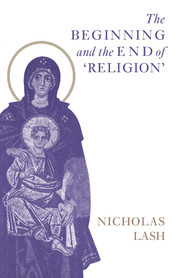Book contents
- Frontmatter
- Contents
- Preface
- PART ONE A MEETING-PLACE FOR TRUTH
- PART TWO EMERGING FROM MODERNITY
- 4 Observation, revelation and the posterity of Noah
- 5 On what kinds of things there are
- 6 Contemplation, metaphor and real knowledge
- 7 When did the theologians lose interest in theology?
- 8 Anselm seeking
- 9 Creation, courtesy and contemplation
- 10 Hollow centres and holy places
- 11 Hoping against hope, or Abraham's dilemma
- 12 Eagles and sheep: Christianity and the public order beyond modernity
- 13 Incarnation and determinate freedom
- 14 Beyond the end of history?
- List of works cited
- Index
14 - Beyond the end of history?
Published online by Cambridge University Press: 05 March 2012
- Frontmatter
- Contents
- Preface
- PART ONE A MEETING-PLACE FOR TRUTH
- PART TWO EMERGING FROM MODERNITY
- 4 Observation, revelation and the posterity of Noah
- 5 On what kinds of things there are
- 6 Contemplation, metaphor and real knowledge
- 7 When did the theologians lose interest in theology?
- 8 Anselm seeking
- 9 Creation, courtesy and contemplation
- 10 Hollow centres and holy places
- 11 Hoping against hope, or Abraham's dilemma
- 12 Eagles and sheep: Christianity and the public order beyond modernity
- 13 Incarnation and determinate freedom
- 14 Beyond the end of history?
- List of works cited
- Index
Summary
CONSIDERING WHAT LIES AHEAD
‘Where there is no escape, people ultimately no longer want to think about it. This eschatological ecofatalism allows the pendulum of private and political moods to swing in any direction. The risk society shifts from hysteria to indifference and vice versa.’ Not all the voices that we hear, of course, are variants of fatalism, aspects of despair. There are still many people whose imaginations are tuned to some kind of optimism by the mythical conviction that modern industrial society, with ‘its thinking in categories of economic growth, its understanding of science and technology and its forms of democracy’, represents a ‘pinnacle’ of human achievement ‘which it scarcely makes sense even to consider surpassing. This myth has many forms of expression. Among the most effective is the mad joke of the end of history.’
Defending his original thesis, Francis Fukuyama insisted that ‘What I had suggested had come to an end was not the occurrence of events, even large and grave events, but History: that is, history understood as a single, coherent, evolutionary process, when taking into account the experience of all peoples in all times.’ By this, Fukuyama might have meant that this long century's suffering had cured us of the illusion that ‘History’ had ever happened; that we (whoever ‘we’ may be) might ever reasonably deem all other societies, past and present, inferior to our own.
- Type
- Chapter
- Information
- The Beginning and the End of 'Religion' , pp. 252 - 264Publisher: Cambridge University PressPrint publication year: 1996



